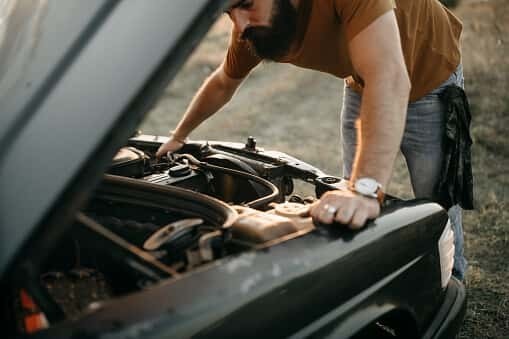At CARS.EDU.VN, we understand that facing an engine replacement can be daunting. How Much Does A New Car Engine Cost? It is a question that many car owners face, and we’re here to provide you with a comprehensive answer! We will explore the factors influencing the expense, from the type of vehicle you drive to the kind of engine you choose, ensuring you’re well-informed to make the best decision. Discover expert advice on navigating engine replacement costs and explore solutions for keeping your vehicle running smoothly.
1. Decoding Engine Failure: Recognizing the Warning Signs
Your engine is vital to your car’s function, so it’s essential to recognize the signs of potential failure early. Detecting these symptoms can prevent further damage and potentially save you from extensive repairs. Here are some key indicators to watch out for:
- A Check Engine Light: This is a common signal that something is amiss. While it could indicate a minor issue like a loose gas cap, it can also signal a more severe engine problem. Using an OBD-II code reader can help diagnose the specific issue.
- Decreased Performance: A failing engine often exhibits reduced performance. This can include poor fuel efficiency, loss of power, engine misfires, stalling, or difficulty starting. Overheating is another critical sign.
- Strange Noises: Unusual sounds emanating from the engine bay should raise concern. Knocking, thumping, or grinding noises, especially during acceleration or deceleration, can indicate internal engine problems.
- Increased Exhaust: An unexpected increase in exhaust volume often suggests that something is burning that shouldn’t be. The color of the smoke can provide further clues:
- Black smoke: Indicates too much fuel is entering the engine.
- Blue smoke: Suggests burning engine oil.
- White smoke: Could mean antifreeze or coolant is burning.
- Excessive Oil Consumption: Needing to refill your oil frequently is a significant warning sign. Engine oil lubricates and cools the engine. A lack of oil can lead to rapid wear and tear of engine parts.
- Oil or Coolant Leaks: Puddles of oil or coolant under your vehicle are a clear indication of a leak. Addressing leaks promptly can prevent further damage caused by insufficient fluid levels.
If you notice any of these signs, it’s crucial to consult a qualified mechanic immediately. They can perform diagnostic tests and provide an accurate assessment of your engine’s condition, advising on the best course of action, whether rebuilding or replacing the engine.
 Check Engine Light
Check Engine Light
2. Gauging the Cost: Factors Influencing Engine Replacement Prices
“How much does a new car engine cost?” is a multifaceted question. The price of an engine replacement can vary significantly based on several factors, making it essential to understand these variables to estimate the potential expense accurately.
On average, expect to pay between $5,000 and $10,000 for an engine replacement. However, this is just a general range. The actual cost can be higher or lower depending on the following:
2.1. Type of Vehicle
The make and model of your vehicle significantly impact the cost of an engine replacement. Luxury and high-performance vehicles typically have more expensive engines and require specialized labor, increasing the overall cost.
2.2. Engine Type
The type of engine needed (e.g., four-cylinder, V6, V8, turbocharged) will affect the price. More complex and powerful engines usually cost more to replace.
2.3. New vs. Used Engine
- New Engines: These are the most expensive option, offering the best reliability and warranty coverage.
- Remanufactured Engines: These engines are rebuilt by specialized technicians and can provide similar performance to new engines at a lower cost.
- Used Engines: Sourced from salvage vehicles, used engines are the cheapest option but come with the highest risk due to uncertain quality and limited warranty.
Sean Kim, an experienced mechanic, notes that used engines can range from $600 to $6,000, while new engines can cost between $3,000 and $14,000, depending on the model.
2.4. Labor Costs
Labor costs vary depending on the complexity of the job and the mechanic’s hourly rate. Replacing an engine can take anywhere from 10 to 20 hours of labor. Kim estimates labor costs to be between $1,200 and $2,200, influenced by the vehicle’s complexity and programming requirements.
2.5. Additional Parts and Services
Besides the engine itself and the labor, you may need to factor in the cost of additional parts such as hoses, belts, fluids, and filters. There may also be additional services required, such as diagnostics, programming, and testing, which can add to the overall cost.
Considering these factors will help you get a more accurate estimate for your engine replacement. Always consult with a trusted mechanic to assess your specific situation and provide a detailed quote.
3. Budget-Friendly Alternatives: Rebuilding Your Engine
Instead of a full replacement, rebuilding your engine can be a cost-effective alternative. Engine rebuilding involves disassembling the engine, inspecting its components for damage, and then reassembling it with new or remachined parts.
3.1. Cost Comparison: Rebuild vs. Replace
Typically, a full engine rebuild costs between $2,500 and $4,000, varying with the vehicle type and extent of the damage. This is generally less expensive than replacing the engine.
3.2. Advantages of Rebuilding
- Cost Savings: Rebuilding can save you money compared to buying a new or remanufactured engine.
- Preservation of Original Engine: Rebuilding allows you to keep the original engine, maintaining its authenticity and potentially preserving optimal performance.
3.3. Potential Drawbacks
- Uncertainty of Results: As Kim points out, engine rebuilds don’t always come out perfectly. The success of a rebuild depends heavily on the mechanic’s skill and the condition of the remaining engine components.
- Time-Consuming: Rebuilding an engine can take up to two weeks, depending on the extent of the work required.
- Potential Resale Concerns: Some buyers may hesitate to purchase a vehicle with a rebuilt engine, raising concerns about reliability.
3.4. Making the Right Decision
Before opting for a rebuild, consider factors like the vehicle’s age, mileage, and overall condition. If the engine failure is isolated and the rest of the vehicle is in good shape, rebuilding may be a suitable option. However, if the vehicle is nearing the end of its life, a rebuild may not be cost-effective in the long run.
Discuss your options with a trusted mechanic who can assess your engine’s condition and provide an informed recommendation.
4. Warranty Wonders: Will Your Car Warranty Cover Engine Costs?
Understanding your car warranty coverage is essential when facing engine repairs or replacement. Most bumper-to-bumper and powertrain warranties cover engine repairs, so you may be in luck if your vehicle is still under its factory warranty.
4.1. What Warranties Cover
- Factory Warranty: This warranty covers repairs needed due to factory defects. If your engine fails for no apparent reason, the manufacturer may cover the entire cost of the replacement.
- Extended Auto Warranty: If your car is no longer under its factory warranty, an extended warranty can be worth considering. A basic powertrain extended warranty can cover the cost of a significant engine replacement.
4.2. Situations Where Coverage May Be Denied
Warranties typically do not cover engine failures caused by:
- Damage (e.g., from a collision or extreme weather)
- Misuse or abuse (e.g., racing, off-roading, or towing too much)
- Negligence (e.g., missed oil changes)
4.3. The Importance of Routine Maintenance
Adhering to the routine maintenance schedule recommended in your owner’s manual is critical. Maintenance helps prevent engine failures and avoids one of the main reasons warranty claims are denied.
4.4. Timing is Key
Extended warranties do not cover pre-existing conditions, so sign up before your engine shows signs of failure.
ConsumerAffairs reviewer Cindae from Pennsylvania was grateful for her extended warranty, which covered a torque converter and an engine replacement.
5. Financing Your Fix: Options for Managing Engine Replacement Costs
Engine replacements can be a significant financial burden, but several financing options can help manage these costs.
5.1. Auto Repair Loans
Many financial institutions offer personal loans specifically for car repairs. These loans typically have fixed interest rates and predictable monthly payments.
5.2. Credit Cards
Using a credit card can provide a quick way to finance an engine replacement. However, this option can lead to high-interest charges if the balance isn’t paid off promptly.
5.3. In-House Financing from Repair Shops
Some repair shops offer their financing programs or partner with financing companies to help customers pay for major repairs.
5.4. Emergency Funds
Using an emergency savings fund is ideal for covering unexpected expenses like engine replacements. This helps you avoid taking on debt.
5.5. Comparing Options
Compare rates, terms, and conditions across different financing options to find the best fit for your situation.
A ConsumerAffairs investigation revealed that many drivers can’t afford a $1,000 repair, so exploring financing options is essential for those without sufficient savings.
6. FAQ: Addressing Common Concerns About Engine Replacement
6.1. What are some drawbacks of an engine replacement?
- Higher upfront costs than rebuilding.
- Salvaged engines require thorough assessment to prevent future complications.
- Switching to a different engine model may present compatibility and integration challenges.
- Modifying the rest of your vehicle can require additional time, effort, and money.
6.2. What should you consider before replacing an engine?
Evaluate the vehicle’s overall condition and your long-term plans for the car. Assess the compatibility and integration requirements for the new engine.
6.3. Can you install an engine from a different manufacturer?
Yes, but it can be costly and time-consuming. Opting for an engine specifically designed for your model will ensure a smoother installation process and minimize compatibility issues.
6.4. What are the pros and cons of rebuilding an engine?
Engine rebuilds are generally less expensive than engine replacements, making them a more budget-friendly option. Rebuilding also means you can keep the original engine, preserving its authenticity and potentially maintaining optimal performance. However, it can take up to two weeks to complete, and future buyers may hesitate to purchase a vehicle with a rebuilt engine due to concerns about reliability.
6.5. What should you consider before rebuilding an engine?
- Age and Mileage: If your vehicle has high mileage or is nearing the end of its life, a rebuild may not be the most cost-effective option in the long run.
- Overall Condition: If the engine failure is an isolated issue and the rest of the vehicle is in good shape, rebuilding the engine may be a suitable choice.
- Future Plans: If you plan to keep your vehicle for an extended period, investing in an engine rebuild may be worthwhile. However, if you’re considering selling or upgrading soon, the impact on resale value may not be worth it.
6.6. How does a car engine work?
An engine combines air and gas to create tiny explosions. These explosions push on pistons, which in turn rotate a device called a crankshaft. The crankshaft turns gears, which eventually turn the wheels.
6.7. How long is an engine supposed to last?
When properly maintained, most vehicle engines are designed to last well over 100,000 miles.
6.8. How can I extend the life span of a newly replaced engine?
Change the oil as often as the manufacturer recommends. Following regular maintenance routines is essential to ensure longevity. Adhere to the routine maintenance outlined in your owner’s manual, be gentle on it, and promptly have any suspicious noises or behaviors inspected.
6.9. Does car insurance cover engines?
Car insurance policies typically do not cover engine repairs or replacements resulting from mechanical failures or normal wear and tear. Mechanical breakdown insurance (MBI) specifically covers engine repairs or replacements.
7. New Car Models and Innovative Technologies
Staying updated with the latest car models and innovative technologies can help you make informed decisions about your vehicle and its engine. Here are some recent developments in the automotive industry:
| Feature | Description | Benefits |
|---|---|---|
| Electric Vehicles | Electric vehicles (EVs) are powered by electricity rather than gasoline. They use a large battery pack to power an electric motor. | Reduced emissions, lower running costs, quieter operation, and potential tax incentives. |
| Hybrid Vehicles | Hybrid vehicles combine a gasoline engine with an electric motor and battery pack. They offer improved fuel efficiency compared to traditional gasoline cars. | Better fuel economy, lower emissions, and regenerative braking. |
| Advanced Driver Assistance Systems (ADAS) | ADAS technologies include features like adaptive cruise control, lane departure warning, automatic emergency braking, and blind-spot monitoring. | Enhanced safety, reduced driver fatigue, and improved overall driving experience. |
| Over-the-Air (OTA) Updates | OTA updates allow car manufacturers to send software updates to vehicles remotely, without the need for a trip to the dealership. | Convenient access to new features, bug fixes, and performance improvements. |
| Connected Car Services | Connected car services provide features like navigation, real-time traffic updates, remote vehicle access, and emergency assistance through a cellular or Wi-Fi connection. | Improved convenience, safety, and access to information while on the road. |
| Autonomous Driving Technology | Autonomous driving technology aims to create self-driving cars that can navigate and operate without human intervention. This technology is still in development, but it has the potential to revolutionize transportation. | Increased safety, reduced traffic congestion, and improved mobility for people who cannot drive themselves. |
| Enhanced Engine Technologies | Advancements in engine technology include improvements in fuel efficiency, emissions reduction, and performance. These advancements include features like direct fuel injection, turbocharging, and variable valve timing. | Better fuel economy, reduced emissions, and increased power and performance. |
| Materials Science | The use of lightweight materials like aluminum, carbon fiber, and high-strength steel can improve fuel efficiency and handling. | Increased fuel efficiency, better handling, and improved safety. |
By staying informed about these innovations, you can make more informed decisions when choosing your next vehicle or considering upgrades to your current one.
8. Navigating Your Car Care Journey with CARS.EDU.VN
We hope this comprehensive guide has answered your question, “How much does a new car engine cost?” and provided valuable insights into engine replacement and related topics. At CARS.EDU.VN, we are dedicated to providing you with the information and services you need to keep your vehicle running smoothly and efficiently.
8.1. Your Challenges, Our Solutions
We understand the challenges car owners face, such as:
- Finding reliable and trustworthy auto repair services.
- Lacking knowledge about routine car maintenance to prevent significant issues.
- Struggling to choose the right vehicle and brand for your needs and budget.
- Feeling overwhelmed when trying to troubleshoot minor car problems.
- Desiring to stay updated on the latest automotive technologies and reviews.
8.2. How CARS.EDU.VN Can Help
CARS.EDU.VN offers services designed to address these challenges:
- Detailed Service Information: Access in-depth information about car care and repair services.
- Easy-to-Understand Maintenance Guides: Learn how to perform routine maintenance tasks.
- Expert Car Reviews and Comparisons: Make informed decisions about vehicle purchases.
- Troubleshooting Guides: Get step-by-step instructions for resolving minor car issues.
- Automotive News and Technology Updates: Stay informed about the latest industry trends.
We are committed to providing you with the knowledge and resources you need to navigate the complexities of car ownership.
8.3. Call to Action
Ready to learn more and find the services you need? Visit CARS.EDU.VN today!
- Address: 456 Auto Drive, Anytown, CA 90210, United States
- WhatsApp: +1 555-123-4567
- Website: CARS.EDU.VN
Let cars.edu.vn be your trusted resource for all things automotive. Explore our website today and discover a wealth of information and services designed to enhance your car ownership experience!

